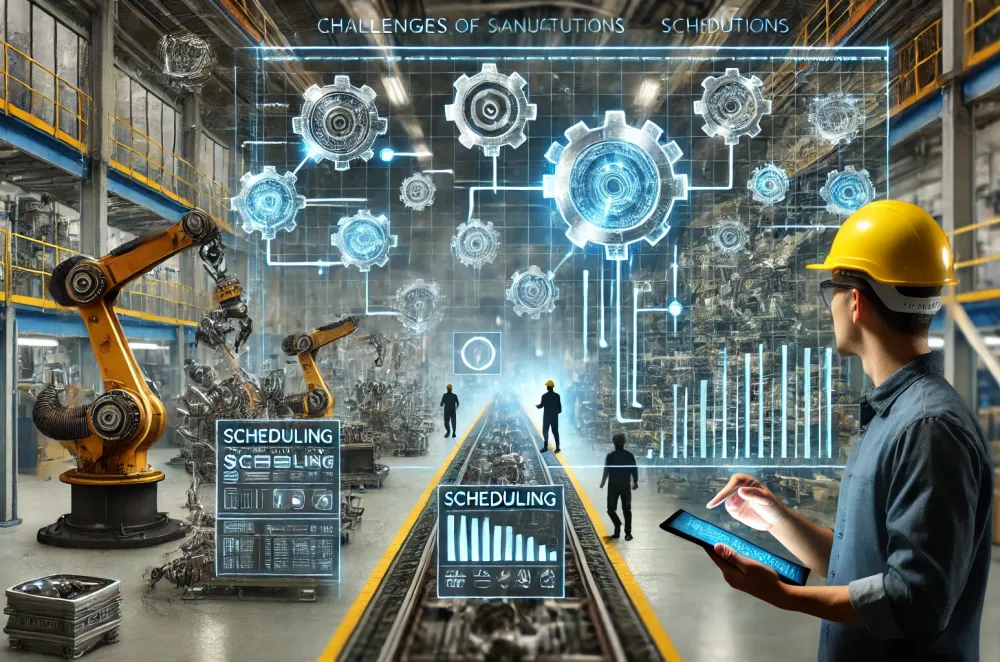The Challenges of Manufacturing Scheduling and How Modern Solutions Are Addressing Them
Manufacturing scheduling is a complex and critical component of production management, directly impacting efficiency, productivity, and profitability. Various challenges arise in the scheduling process, but modern solutions are emerging to address these issues effectively. This post explores the primary challenges of manufacturing scheduling and how contemporary technologies and methodologies are overcoming them.
The Challenges of Manufacturing Scheduling and How Modern Solutions Are Addressing Them
Challenges in Manufacturing Scheduling
1. Complexity of Production Processes
Manufacturing often involves intricate processes with multiple steps, dependencies, and resource requirements. Scheduling these processes to optimize time, resources, and output is highly complex.
- Interdependencies: Tasks are often dependent on the completion of previous tasks, complicating the scheduling.
- Resource Allocation: Ensuring the availability of machines, materials, and labor at the right time is challenging.
- Variability: Variations in processing times, machine performance, and material availability can disrupt schedules.
2. Unpredictable Demand
Fluctuating customer demand and market conditions make it difficult to create accurate production schedules.
- Demand Variability: Sudden changes in order volumes can lead to overproduction or underproduction.
- Short Lead Times: Customers increasingly demand faster delivery times, putting pressure on manufacturing schedules.
- Customization: Personalized products require flexible scheduling to accommodate specific customer requirements.
3. Equipment Downtime
Unplanned equipment downtime can severely disrupt production schedules, leading to delays and increased costs.
- Maintenance: Scheduling regular maintenance without affecting production is challenging.
- Breakdowns: Unexpected equipment failures can halt production and necessitate rescheduling.
- Capacity Constraints: Limited machine availability due to downtime affects overall scheduling efficiency.
4. Supply Chain Disruptions
Global supply chains are susceptible to disruptions, impacting material availability and production schedules.
- Logistics Issues: Delays in the supply chain can cause material shortages, affecting production timelines.
- Supplier Reliability: Variability in supplier performance can lead to inconsistencies in material availability.
- Inventory Management: Balancing inventory levels to prevent both shortages and excesses is challenging.
Modern Solutions Addressing Scheduling Challenges
1. Advanced Planning and Scheduling (APS) Systems
APS systems use algorithms and real-time data to create optimized production schedules, addressing the complexity and variability in manufacturing processes.
- Real-Time Data Integration: APS systems integrate data from various sources to provide up-to-date information for scheduling decisions.
- Algorithmic Scheduling: Advanced algorithms consider all constraints and variables to generate efficient schedules.
- Scenario Analysis: APS systems can simulate different scenarios to assess the impact of various scheduling decisions.
2. Predictive Analytics and AI
Predictive analytics and AI help forecast demand and anticipate disruptions, allowing for more accurate and flexible scheduling.
- Demand Forecasting: AI models analyze historical data and market trends to predict future demand, helping to align production schedules accordingly.
- Predictive Maintenance: Predictive analytics identify potential equipment failures before they occur, allowing for proactive maintenance scheduling.
- Optimization Algorithms: AI algorithms optimize scheduling by balancing competing demands and resource constraints.
3. IoT and Real-Time Monitoring
IoT devices and real-time monitoring systems provide visibility into production processes and equipment status, enabling responsive and adaptive scheduling.
- Real-Time Visibility: IoT sensors monitor machine performance, material flow, and production progress in real-time.
- Dynamic Scheduling: Real-time data allows for dynamic adjustments to schedules in response to changes and disruptions.
- Resource Management: IoT systems track resource utilization, ensuring optimal allocation and reducing bottlenecks.
4. Integrated Supply Chain Management
Integrated supply chain management systems enhance coordination between suppliers, manufacturers, and logistics providers, reducing disruptions and improving scheduling accuracy.
- Supplier Collaboration: Integrated systems facilitate better communication and coordination with suppliers, ensuring timely material availability.
- Inventory Optimization: Real-time inventory tracking helps maintain optimal stock levels, reducing the risk of shortages and excess inventory.
- Logistics Management: Advanced logistics management tools optimize transportation schedules and routes, ensuring timely delivery of materials.
Conclusion
Manufacturing scheduling is fraught with challenges, from the complexity of production processes and unpredictable demand to equipment downtime and supply chain disruptions. However, modern solutions such as Advanced Planning and Scheduling systems, predictive analytics, IoT, and integrated supply chain management are effectively addressing these challenges. By leveraging these technologies, manufacturers can create more accurate, flexible, and efficient production schedules, ultimately enhancing productivity and profitability.
Embrace modern scheduling solutions to overcome the challenges in your manufacturing operations and drive continuous improvement and operational excellence.
Interested in digital transformation? Let's discuss!
Other articles
Here’s a breakdown of the most popular online services and communities machinists actually use when troubleshooting CNC problems — ranked by reputation, depth, and real engagement.
